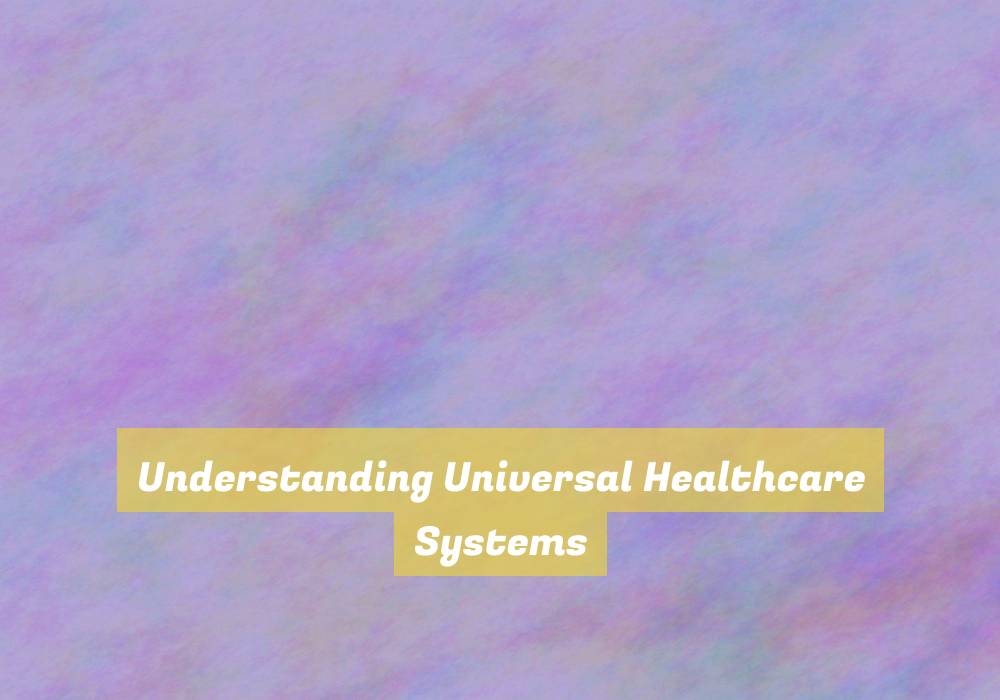Understanding Universal Healthcare Systems
Have you ever wondered how universal healthcare systems actually work and if they truly provide better access to healthcare for all?
The concept of universal healthcare has been a subject of debate and interest for years, and understanding its complexities and nuances is essential in todayG??s global context.
As you navigate through the various models, benefits, challenges, and societal implications, youG??ll gain a deeper insight into how universal healthcare systems impact individuals and communities, and why itG??s a topic that continues to spark widespread interest and discussion.
Different Models of Universal Healthcare
When considering different models of universal healthcare, itG??s important to understand the varying approaches taken by countries around the world.
In some countries, such as the United Kingdom, a single-payer system is employed, where the government is the sole provider of healthcare services. This means that healthcare is funded through taxes and is accessible to all citizens, regardless of their ability to pay.
Other countries, like Germany and the Netherlands, use a social insurance model, where healthcare is provided by private entities but heavily regulated by the government. Citizens are required to have health insurance, with subsidies provided for those who canG??t afford it.
Then there are countries like Canada, which utilize a national health insurance model. Here, the government provides funding for healthcare services, but the actual care is delivered by private providers.
Understanding these different models is crucial as it allows policymakers to evaluate which system might work best for their own country, considering factors such as cost, quality of care, and accessibility.
Benefits and Challenges
Considering the benefits and challenges of universal healthcare systems can provide valuable insight into the overall effectiveness and sustainability of such models.
On the positive side, universal healthcare ensures that all citizens have access to essential medical services, regardless of their financial situation. This promotes a healthier population and can lead to early detection and treatment of illnesses, reducing overall healthcare costs. Additionally, it can alleviate the burden of healthcare expenses on individuals and families, leading to greater financial security and peace of mind.
However, universal healthcare systems also face significant challenges. One major concern is the potential strain on resources and long waiting times for non-emergency procedures due to increased demand for services. Funding universal healthcare can also be a considerable challenge, as it requires substantial government investment and may lead to higher taxes. Additionally, there are concerns about the potential for decreased innovation and quality of care in a government-controlled healthcare system.
Understanding these benefits and challenges is critical in evaluating the feasibility and potential impact of universal healthcare systems on society.
Impact on Healthcare Delivery
Universal healthcare systems have a significant impact on the delivery of healthcare services, influencing accessibility, quality, and patient outcomes.
With universal healthcare, you have the advantage of improved accessibility to essential healthcare services. This means that individuals who previously struggled to afford or access healthcare can now receive the necessary medical attention without financial barriers. Additionally, universal healthcare systems often lead to a more equitable distribution of healthcare resources, ensuring that even marginalized or underserved populations have the opportunity to receive quality care.
Moreover, the impact on healthcare delivery extends to the overall quality of services. In a universal healthcare system, thereG??s an emphasis on preventive care and early intervention, which can lead to better health outcomes for patients. You can also expect to see a focus on evidence-based practices and standardized protocols, promoting a higher quality of care across the board.
Furthermore, patient outcomes are positively influenced by universal healthcare systems. With improved access to care and a focus on preventive measures, individuals often experience better health outcomes and a higher quality of life. This can lead to reduced healthcare disparities and an overall healthier population.
Societal Implications
Yes, thereG??s been a noticeable shift in societal attitudes towards healthcare with the implementation of universal healthcare systems. People are now more inclined to view healthcare as a fundamental right rather than a privilege. This has led to a greater emphasis on preventive care and a more proactive approach to overall health and well-being. Additionally, thereG??s been a reduction in the stigma associated with seeking medical assistance, as universal healthcare systems have made healthcare services more accessible to all members of society.
Moreover, the implementation of universal healthcare systems has fostered a sense of social solidarity and community well-being. Individuals now feel a greater sense of security and stability knowing that theyG??ve access to essential healthcare services without the fear of financial burden. This has contributed to a more cohesive and healthier society overall.
Conclusion
So, now you understand the different models of universal healthcare.
Its benefits and challenges, as well as its impact on healthcare delivery and societal implications.
ItG??s clear that universal healthcare systems play a crucial role in providing accessible and affordable healthcare to all individuals, regardless of their financial status.
This understanding can help inform discussions and decisions about healthcare policies and systems in the future.





